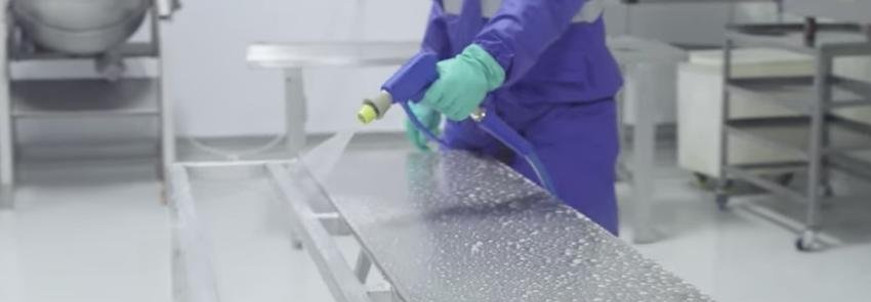
Image credit: www.qjs.co.uk.
You work with chemicals. That comes with risks. Here are some simple ways to make sure your chemical handling process keeps your staff and your business safe.
Chemical complications...
Working with chemicals presents risks. You don’t need to be a doctor of chemistry to know that. Chemicals can be flammable or explosive. Others burn the skin. Some cause respiratory problems. Prolonged use of certain chemicals could even cause long-term health conditions.
Yet your business depends on the use of chemicals for washdowns, cleaning, production machinery and so on. So it’s essential that you have a robust chemical handling process. Not just to keep your staff safe, but to protect your business from nasty legal complications too. To prevent something going very, very wrong, you need to spot chemical risks and implement controls.
Here are seven points to consider.
1. Create a chemical inventory
Do you know exactly which chemicals you are holding? The first step is to create an inventory of the various potions used on your site. And we are talking about more than a simple list. For each chemical detail the quantities you work with, the storage location, the processes they are used in and the risks associated with them.
This is not something you want to rush. It may not be the most enthralling task, but it will form the backbone of your entire chemical handling process. Besides, it’s a legal requirement.
Think critically about how each chemical is being used and who’s using it. Review each chemical and understand the risks. Then create safety data sheets that explain the controls required to keep staff safe - that could be specific storage instructions or the use of protective clothing, for example.
2. Train, train and train some more
Training is one of the simplest ways to protect your business. All relevant staff should be aware of the controls in place when handling chemicals. There’s no room for half-measures.
3. Get protective equipment
Is personal protective equipment required to handle certain chemicals? What about clearing chemical spills? Make sure all protective equipment has a designated storage zone and is well maintained. Your staff must know where to find the items they need. And it has to be fit for purpose. Otherwise it’s useless.
4. Store chemicals correctly
Storage is one of the most important items on this list. So it’s alarming that it’s often overlooked. In short: chemicals that are stored incorrectly can become explosive. Read warning labels, follow the storage instructions and never store acids with alkalis.
Just as important is to store chemicals in locked premises that only trained staff can access. You don’t want hazardous chemicals falling into the wrong hands. If necessary make sure there’s enough ventilation to prevent the build up of noxious gases.
5. Don’t fall down on spillages
Humans are fallible. No matter how robust your chemical handling process, accidents can happen. When chemicals are spilled it’s important they are cleaned as soon as possible. Create designated spill stations in key risk areas across your site. Your safety datasheet (see point one) should contain clear instructions on how to handle different chemicals. Lots of businesses fail to create a recognised procedure for spillages. Don’t slip up.
6. First aid
As we said at the start, certain chemicals can cause burns or respiratory problems if they’re not handled correctly. Make sure your first aiders are aware of how to respond to chemical risks and that all the equipment they need is available.
7. Research alternatives
There are some potent chemicals out there. But often - especially when it comes to cleaning products - there are alternative products that are less hazardous but capable of doing the same job. Review your cleaning and production operations and take a look at the alternatives. It could save you money and a lot of hassle.
Over to you...
When it comes to chemicals, things can get complicated. That leads to some businesses persisting with chemical handling procedures that aren’t right for their site. But while chemistry can furrow the brow, chemical handling doesn’t have to. Get the basics right and you will have laid the foundations for a protocol that keeps your staff safe and your business efficient.


